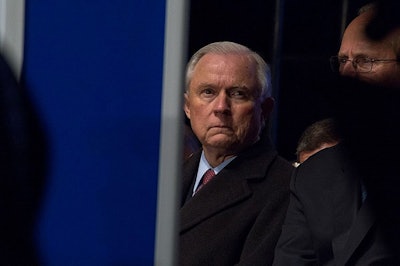
U.S. Attorney General Jeff Sessions shows no signs of backing away from a potential Department of Justice (DOJ) crackdown on state-legal cannabis businesses, despite an agreement reached by President Donald Trump and Sen. Cory Gardner (R-CO) earlier this spring.
After Sessions’ repeal of the Cole Memo in January, Gardner vowed to block all DOJ appointments until Sessions softened his stance on cannabis, a siege that prevented at least 11 nominees from getting a Senate floor vote.
In April, Trump promised Gardner that he would support congressional efforts to protect states that have legalized cannabis within their borders. On Friday, Trump said he “probably will end up supporting” the STATES Act, which was introduced by Gardner and Sen. Elizabeth Warren (D-MA), also on Friday, to eliminate the threat of federal intervention and prosecution in states that have regulated marijuana use and sales.
Sessions, on the other hand, has told Colorado Public Radio (CPR) that he was not told by Trump to back off from states that have legalized cannabis. “I did not have a meeting to discuss in detail what [Gardner’s] comments were,” he said. “They were more about the potential future legislation, as I recall it, and we were not ordered to do anything other than the policies that we intend to carry out nationally.”
“Marijuana remains prohibited by federal law, and Congress presumably will consider [the STATES Act],” Sessions added. “At this time, my view is clear, that the federal law remains in effect nationwide, just like it does for heroin and cocaine. Of course, [marijuana’s] not the death-dealing drug in the same way that fentanyl or heroin is, but it remains on the books as a prohibited substance.”
Sessions emphasized that the Cole Memo no longer protects against federal intervention in cannabis-related matters. “It remains clear that the Cole Memo has been withdrawn and the impact of that is essentially to make clear that we are not guaranteeing and cannot guarantee persons who use or distribute marijuana are protected from federal prosecution,” he said. “I don’t think it’s appropriate for me to, in effect, violate or neuter federal marijuana law.”
But while Sessions seems intent on upholding the federal prohibition on cannabis, he acknowledged that the DOJ has “priorities” when it comes to prosecution. "I can't give them immunity,” he said. “I can't guarantee that they are free from any consequences from an act that is contrary to United States law. We've got priorities. U.S. Attorneys around the country have heavy demands on them. And the federal government has never prosecuted on any kind of regular basis, small amounts of marijuana. It's just, our priorities are smuggling rings, and more deadly drugs normally."
Despite his firm anti-cannabis stance, Sessions did acknowledge in his comments to CPR that marijuana may have medicinal benefits. “You can have an extract from marijuana that improves epilepsy treatment,” he said. “I am very open to that possibility—haven’t studied the data on it—but to say that’s the same that young people should feel free to use marijuana every afternoon after school is a big difference.”
Top photo courtesy of Wikimedia Commons


























